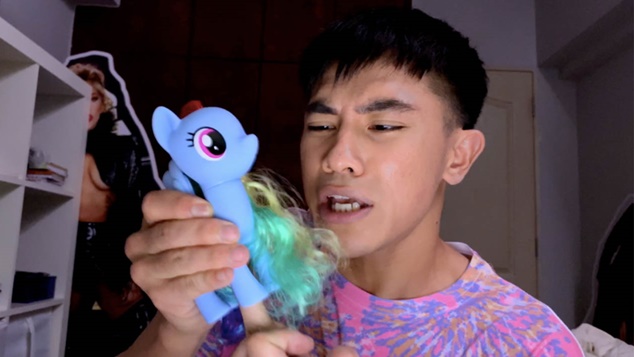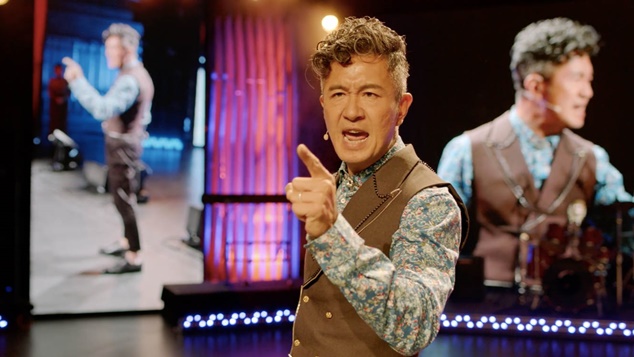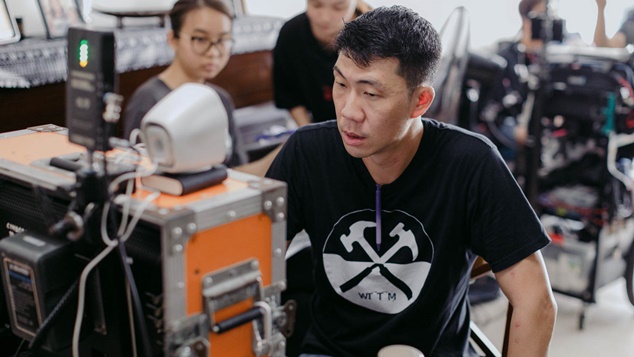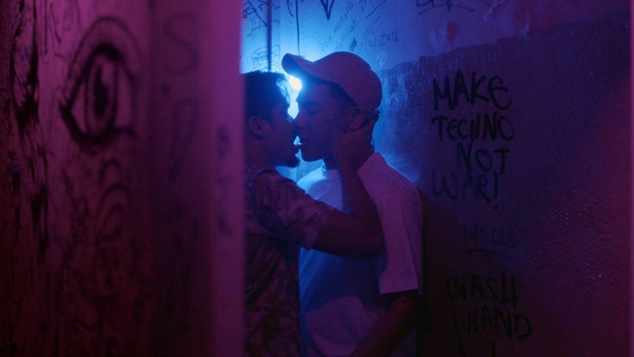
Director Ken Kwek’s new film #LookAtMe received high praise when it screened recently at the New York Asian Film Festival, but in his home country of Singapore the film has been banned by authorities.
Singaporeans have been prevented from seeing the film after authorities said it “denigrates a religious community” and had the “potential to cause enmity and social division”. While Singaporeans can’t see the work, Perth film-lovers will have a chance to see it when it screens as part of PrideFEST.
Director Ken Kwek will be attending a screening of #LookAtMe at the Widsor Cinemas in Nedlands and taking part in a Q&A session. It’s the film’s Australian premiere and local audiences will be among the first in the world to see the movie.
Here’s what the film is about; When teenagers Sean and Ricky are invited to attend church with Sean’s girlfriend, they are treated to an Evangelical rock concert capped by a searing anti-LGBTQ sermon. Sean, a Youtuber, soon gets into trouble for dropping an outrageous video lampooning the megachurch’s pastor. He is widely condemned and prosecuted for flouting Singapore’s strict laws on public expression. As Sean descends into near madness in prison, his gay twin brother, Ricky, gains prominence as a LGBTQ activist. Both find themselves at the heart of a culture war that spills out from social media into the real world.
One of the challenges the production faced was casting twins in the film, eventually they decided on casting just a single actor to play both roles, and actor Yao has received a lot of praise for his spellbinding performance.
Director Ken Kwek tells OUTinPerth that it was essential that the story focussed on twins, rather than just brothers.
“I’ve been working in Singapore, in film and theatre, for about 15 years. Singapore is a small country, so I have a good sense of the acting talent. Because of my work in the theatre, I’ve often cast theatre actors in my films too.
“I knew that it would be impossible to find a pair of twins, one to play a gay character and one to play a straight character, or even if they were both straight, it would have been very hard to find a pair of twin actors who were that good.
“One my producers actually said, “Do they really even have to be twins? Can’t they just be brothers who aren’t twins? Why make your life so difficult?”
“But having the lead characters as twins was important to me dramatically. First, there’s the real-life fact that twins with different sexual orientation is actually not that uncommon. In fact, there are two sets of twins involved in the film who are gay-straight pairings.
“The other reason why I wanted the protagonists to be twins is because I wanted to simply get rid of that argument about whether homosexuality is a matter of nature or nurture, I wasn’t interested in exploring that in the film. The characters are genetically identical, and they have the same upbringing. But those aren’t the important issues.
“The important issues are things like laws and rights, LGBTQ rights, laws that govern different forms of behaviour or expression, whether it’s sexual, political or artistic.” Kwek said.
In their statement citing the reasons for the censorship of #LookAtMe Singaporean authorities said the film’s content was “suggestive of a real pastor in Singapore” and “Persons in Singapore may draw that connection. The context may be seen to be suggesting or encouraging violence against the pastor.”
In 2015 Singaporean YouTuber Amos Yee uploaded a video that criticised Singapore’s founding Prime Minister Lee Kuan Yew. He compared the recently deceased leader to Jesus, and also uploaded an image to his blog which depicted the former Prime Minister having anal sex with British Prime Minister Margaret Thatcher.
Yee was arrested for “intention of wounding the religious feelings of Christians”, obscenity, and “threatening, abusive or insulting communication.” His subsequent trial drew intense media coverage, and he was sentenced to four weeks imprisonment.
Director Ken Kwek said that while is film was inspired in part by this famous case in Singapore, it was not the sole inspiration.
“The film was inspired by true events. I think ‘inspired’ is an important word, as opposed to ‘based on’. And there were different events that inspired this film, not just one.” Kwek said.
“It’s fair to say that Amos Yee was one of the first inspirations in 2015, not so much Amos Yee the person and the specific details of his case, but rather the general fact that he was the first YouTuber who had been prosecuted and jailed under a law that legislates against offending the feelings of a community.
“That struck me, because that sounds precarious. Feelings are slippery things, and it’s problematic that we have a law that can be used against a person’s subjective ability to offend and send this person to prison.
“That definitely was an inspiration. Since then, there have been at least a dozen other cases of people being punished for offending speech. Rappers, activists and other social media influencers, people who were deemed to have transgressed in terms of something they said or participating in an illegal assembly, things like that.

Kwek commented that Singapore is a unique country that enjoys a very peaceful society, but also a high level of censorship and repression.
“What makes these draconian laws strange is that if you come to Singapore, we have all the trappings of a very developed country. Not just in terms of the economy, I think we’re a very beautiful country as well in many ways. ” Kewk said.
“But there’s a disconnect between our economic advancement and our political regression, we still have the death penalty, for example. And the laws on freedom of expression are very regressive. There is a lot of censorship in the media, the depiction of LGBTQ characters is heavily circumscribed in broadcast television and radio. It’s quite a repressive society in many ways.”
The director said it’s hugely disappointing that his film has been banned, and it’s not the first-time audiences have been prevented from seeing his films.
“For a while, there was this little kind of guessing game amongst my producers. And we all swung between moods of optimism and pessimism.
“Ten years ago, I had an anthology of short films called Sex.Violence.FamilyValues that was banned for its satirical content. I wanted to think that we’ve made some progress since. Surely we live in a more open society, surely the ubiquity of social media and the Internet must foster some change in terms of how censorship is practiced. I was wrong.
“I do think that there would have been an audience for it. I do think that there’s now a younger, more diverse and progressive audience who would want to see this movie in Singapore. I don’t think that this would have been one of those esoteric films that didn’t get seen by a significant audience, we had a distributor on board and were ready to release it commercially.” Kwek said.
While the concern over the film has related to its commentary on the Evangelical Christian movement in the country, Kwek does not believe it would have been possible to tell the story without their inclusion.
“I think it’s unavoidable when you’re talking about gay rights to talk about the pushback from the religious right. I have to be very clear that I am talking about very ultra-conservative people, not the vast swathes of other Christians in my country.
“They have been the most vocal in arguing against the repeal of 377 A, and in promoting harmful programs such as conversion therapy.
“It was not possible for me to make a film about a young gay man’s evolution as a gay rights activist in Singapore, fighting for change, and not also look squarely at those who resist that activism and the LGBTQ movement.”

While the censorship of #LookAtMe stops criticism of Evangelical Christians, it also stops a positive depiction of LGBT people being seen as well.
“I think censorship can have a profound and problematic effect on young queer people coming out or being themselves or growing up in Singapore. Because censorship renders people invisible in culture.
“One of the things that I really want to do with my film was to dramatize a very ordinary, loving family, where the sons are not even be aware that homosexuality is criminalised until it’s brought to their attention.
“The irony is that, since the film can’t be shown in Singapore, then here’s another positive example of a normalised queer family that is excised from the mainstream media. As an ally, I want LGBTQ people to be more visible in mainstream culture and media. As a filmmaker, that’s also what I want, because it’s more interesting to have more diverse subjects and themes in your film and television output, in your books and in your culture.” Kwek said.

#LookAtMe had its World Premiere at the New York Asian Film Festival and Kwek says it was rewarding to get the massive amount of praise from audiences and critics, especially given the long journey the film had from inception to projection.
“It was really quite wonderful, I have to say. This film was seven years in the making, with scripting begining in 2015. In 2017, frankly, there was a period where I kind of gave up on it. I didn’t think that it was possible to get this film made. I really kind of gave up on it.
“But the story stuck, it just wouldn’t go away. There are so many things in this film that I wanted to convey, not just LGBTQ issues, but Singapore’s wider culture of conservative politics, surveillance, cancel culture. The project refused to die and I’m lucky to have found a group of equally determined producers and executive producers who backed the film.
“Then when the film was finally finished, the pandemic hit and we had to wait it out, wait for major festivals to return to in-person screenings. Because it was so hard getting this film made, we didn’t want it to be shown online, we felt that it deserved to have a big screen premiere.
“When the audience in New York was so warm and celebratory, and when we got very positive notices from critics, of course it was a wonderful feeling, and also a great relief!”
Don’t miss out on seeing #LookAtMe when it screens at the Windsor Cinema on Thursday
Graeme Watson
You can support our work by subscribing to our Patreon
or contributing to our GoFundMe campaign.






